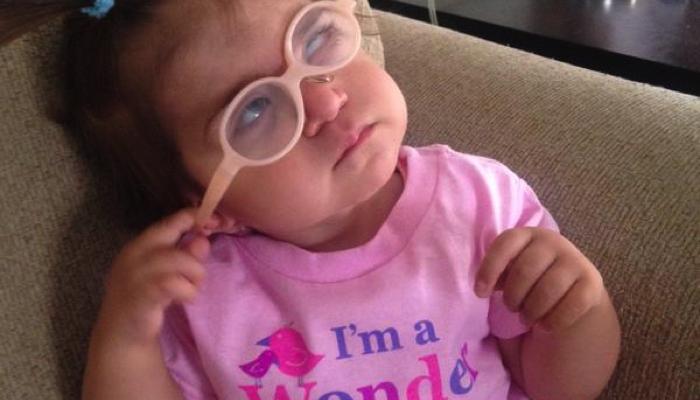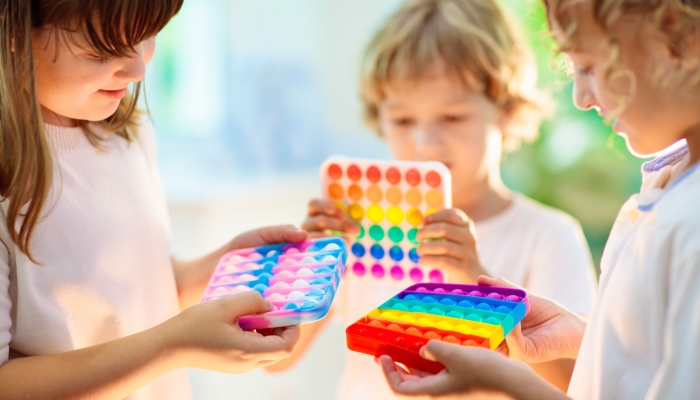Why I Loved Attending the CHARGE Conference

I am still overwhelmed by Shelby’s CHARGE diagnosis and all of her unknowns so I was hesitant to go to the International CHARGE Syndrome conference held in Chicago this year.
CHARGE is a spectrum disorder and no two kids are the same, some walk, some don’t; some talk, some don’t; and I didn’t want to see what Shelby may not be like and I didn’t want to feel guilty about Shelby being more abled than other kids. But I grew up in a home where if you had a responsibility you didn’t have a choice, you did what you had to do to get things done. I told myself, “I have to do this for Shelby, she is my daughter and to be her best mum I need to go and learn, I can’t focus on my fears and worries.” That is what I channeled when I registered for my very first CHARGE conference.
There are so many wonderful and heartbreaking things that I could share with you from my experience. But I’ll start by saying I gave myself a task: Make a small list only three or four items long to do when I got home so that I wouldn’t be overwhelmed or add to the fatigue of doing 10,000 things for Shelby each day. I hope that these will also give you something new to think about or a reminder to start them up again!
Here is my list:
- Get in Shelby’s communication bubble
- Beef up and be consistent with Shelby’s sensory diet
- Use a calendar with Shelby
- Don’t forget about pain
Here is why I focused on these things:
-
- Getting in Shelby’s communication bubble: Yes technically Shelby is deafblind. She has bilateral mild hearing loss and at times wears hearing aids (that’s another story). She is blind in her left eye and her right eye has very low vision with no vision out the top and she is learning to wear her glasses. Because Shelby hears pretty well I tend to shout across rooms to her. “Shelby that’s a great noise I am hearing you make!” “Shelby I’m just taking your sister to the bathroom and then I’ll come back and feed you.” It never occurred to me that this was not helping her, I figured “She can hear me, no biggie.” But in reality I am not doing things in her communication bubble so it isn’t benefiting her. This was a completely new concept for me and I was able to spend some time thinking about what it would be like if I had her low vision and her low hearing and no one came in to my world to play or talk. I’ve started getting in her communication bubble, which is 18 inches from her face, when I want to acknowledge her, play with her, and talk to her, and while I’m in there I am signing more and being more descriptive when I talk with her.
-
- Beefing up Shelby’s sensory diet: I must admit I still don’t get the whole sensory thing, so it opened my eyes to hear top people in CHARGE talk about how not hearing or seeing well AND how not knowing where your body (proprioceptive sense) and head (vestibular sense) are in space can affect someone. I learned that those are some of the reasons why kids get upset or tantrum and once they have their sensory needs met they can continue on their way and go back to feeling good and functioning well. We do the Wilbarger brushing protocol on Shelby and she loves it; we had cut back the frequency but now I am returning to every two to three hours. I am also making an effort to swing and squeeze her several times a day. If nothing else she loves it and smiles when she gets her ‘squeeze-ies’. I do see a difference once Shelby is recharged and (as the experts put) it her ‘senses are reorganized.’
-
- Using a calendar: It is a humbling experience when you hear a speaker describe what it is like to have multi-sensory deficits, and low tone and then adding on top of it not having input to what happens to them during their day. Reflecting on this for Shelby was helpful; most things during her day are done to her or done for her and it must be jarring especially when she doesn’t know where or when any of it will happen. I myself am guilty of never telling Shelby what her day will be like – what we will do, who is coming over, where we are going or when any of this will happen. Surprise! Physical therapy is here. Surprise! You’re going for a car ride but you don’t know where. Here I am starting small. I am now telling Shelby periodically throughout the day what will happen, when, and who might be involved. As she gets older we will expand this to letting her choose what comes next; for example, “Shelby after breakfast do you want to play with your toys or go for a walk?” Including her will give her more control and a better sense of stability in her life.
- Don’t forget about pain: It has been said that kids with CHARGE have a high pain threshold, some researchers are now starting to disagree with this. I also have the mentality that Shelby’s crying isn’t pain related because she has recovered from two open heart surgeries so she knows worse pain. I am changing that! When she cries I add pain in to the equation when I check for what’s wrong.
I have been home from the conference for a week now and am so happy I went! I now have a group of peers who really understand my struggles, that I can reach out to by email or Facebook and will help our family along the way.
Nicole Feeney writes about how God grew the Feeney family from two to four to five in two quick years… and the subsequent adventures on her blog, Fab Feeney Five.

Related Posts

Autism, Sensory Activities, Toys
5 Best Sensory Seeker Toys
Check out our guide to the best sensory seeker toys for kids who like to rock, spin, chew, and fidget. It’s not just about fidget spinners!

Special Needs
Mother’s Day Self-Care: Recognizing and Addressing Maternal Mental Health Needs
It may feel impossible to practice mom self-care, but these simple strategies can help you to prioritize yourself at the top of your to-do list.

Autism, Behavior
7 Ways To Stop Your Child’s Perseveration
You can support your child’s perseveration with practical strategies, support, and a better understanding of their behavior.